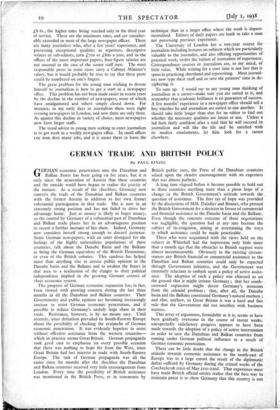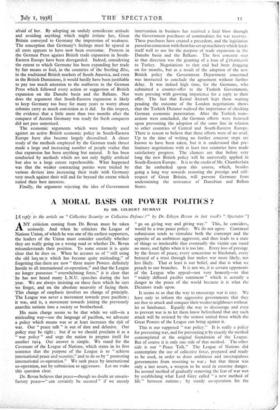GERMAN TRADE AND BRITISH POLICY
By PAUL EINZIG
GERMAN economic penetration into the Danubian and Balkan States has bcen going on for years, but it is only since the annexation of Austria that these countries and the outside world have begun to realise the gravity of the menace. As a result of the Anschluss, Germany now controls the trade of the Danubian and Balkan countries with the former Austria in addition to her own former substantial participation in that trade. She is now in an extremely strong position and has not failed to drive her advantage home. Just as money is likely to beget money, so the control by Germany of a substantial part of Danubian and Balkan trade places her in an advantageous position to secure a further increase of her share. Indeed, Germany now considers herself strong enough to discard pretence. Some German newspapers, with an utter disregard for the feelings of the highly nationalistic populations of these countries, talk about the Danube Basin and the Balkans as being the German equivalent of the British Dominions, or even of the British colonies. This candour.has helped more than anything else to arouse public opinion in the Danube basin and the Balkans and to awaken the States in that area to a realisation of the danger to their political independence implied in the growing German control of their economic system.
The progress of German economic expansion has, in fact, been viewed with growing concern during the last three months in all the Danubian and Balkan countries. Their Governments and public opinion are becoming increasingly anxious to resist German economic penetration, and if possible to reduce Germany's unduly large share in their trade. Resistance, however, is by no means easy. Until recently, utter defeatism prevailed in South-Eastern Europe about the possibility of checking the avalanche of German economic penetration. It was evidently hopeless to resist without effective assistance from the western countries— which in practice meant Great Britain. German propaganda took good care to emphasise on every possible occasion that there was nothing to hope for from the West, since Great Britain had lost interest in trade with South-Eastern Europe. The task of German propaganda was all the easier since for months after the Anschluss the Danubian and Balkan countries received very little encouragement from London. Every time the possibility of British assistance was mentioned in the British Press, or in statements by British public men, the Press of the Danubian countries seized upon the slender encouragement with an eagerness that was almost pathetic.
A long time elapsed before it became possible to hold out to those countries anything more than a pious hope of a change in the British Government's attitude towards the question of assistance. The first ray of hope was provided by the discussions of MM. Daladier and Bonnet, who pressed the British Government for a decision in favour of commercial and financial assistance to the Danube basin and the Balkans. Even though the concrete outcome of these negotiations was negligible, the question had at any rate become the subject of investigation, aiming at ascertaining the ways in which assistance could be made practicable.
Those who were acquainted with the views held on the subject in Whitehall had the impression only little more than a month ago that the obstacles to British support were almost insurmountable. Obviously in the existing circum- stances any British financial or commercial assistance to the Danubian and Balkan countries could only be expected through Government initiative, and the Government was extremely reluctant to embark upon a policy of active assist- ance. The adoption of such a policy was objected to on the ground that it might irritate Germany ; that her south- eastward expansion might divert Germany's attention from the colonial problem ; that, after all, the Danube basin and the Balkans constituted Germany's natural markets ; and that, anyhow, in Great Britain it was a hard and fast rule that the Government did not interfere with business matters.
This array of arguments, formidable as it is, seems to have been gradually overcome in the course of recent weeks. unexpectedly satisfactory progress appears to have been made towards the adoption of a policy of active intervention in order to save the Danubian and Balkan countries from coming under German political influence as a result of German economic penetration.
There can be little doubt that the change in the British' attitude towards economic assistance to the south-east of Europe was to a large extent the result of the diplomatic defeat suffered by Germany during the critical weeks of the Czechoslovak crisis of May zist-22nd. That experience must have made British official circles realise that the best way to maintain peace is to show Germany that this country is not afraid of her. By adopting an unduly considerate attitude and avoiding anything Which might irritate her, Great Britain conveyed to Germany the impression of weakness. The conception that Germany's feelings must be spared at all costs appears to have now been overcome. Protests in the German Press against British trade expansion in South- Eastern Europe have been disregarded. Indeed, considering the extent to which Germany has been expanding her trade by fair means or foul; in the countries of the Sterling Bloc, in the traditional British markets of South America, and even in the British Dominions, it would hardly have been justifiable to pay too much attention to the outbursts in the German Press which followed every action or suggestion of British expansion on the Danube basin and the Balkans. Nor does the argument that South-Eastern expansion is likely to keep Germany too busy for many years to worry about colonies carry as much conviction as it did. In this respect, the evidence that a little more than two months after the ' conquest of Austria Germany was ready for fresh conquests did not pass unnoticed.
• The economic arguments which were formerly used against an active British economic policy in South-Eastern Europe have also become largely discredited. A closer study of the methods employed by the German trade thrust made a large and increasing number of people realise that that expansion has been anything but natural. It has been conducted by methods which are not only highly artificial but also to a large extent reprehensible. What happened was that the weaker contracting parties were tricked by various devices- into increasing their trade with Germany very much against their will and far beyond the extent which suited their best interests.
Finally, the argument rejecting the idea of Government intervention in business has received a fatal blow through the Government purchases of commodities for war reserves. These purchases have created a precedent, and the legislation passed in connexion with them has set up machinery which lends itself well to use for the purpose of trade expansion in the Danube basin and the Balkans. The first concrete step in that direction was the granting of a loan of E16,co0,000 to Turkey. Negotiations to that end had been dragging on for months, but as a result of the adoption of the new British policy the Government Department concerned was instructed to conclude the agreement without further delay. It was indeed high time, for the Germans, who submitted a counter-offer to the Turkish Government, were pressing with growing impatience for a reply to their offer. The fact that Kemal Ataturk kept them waiting pending the outcome of the London negotiations shows that the Turkish Dictator realised the importance of checking German economic penetration. After the Turkish trans- actions were concluded, the German efforts were focussed upon preventing the adoption of the same line in relation to other countries of Central and South-Eastern Europe. There is reason to believe that these efforts were of no avail. Up to the time of writing no further concrete steps are known to have been taken, but it is understood that pre- liminary negotiations with at least two countries have made satisfactory progress. The chances are that before very long the new British policy will be universally applied in South-Eastern Europe. It is to the credit of Mr. Chamberlain that he embarked upon this course, which, besides going a long way towards restoring the prestige and self- respect of Great Britain, will prevent Germany from undermining the resistance of Danubian and Balkan States.



















































 Previous page
Previous page